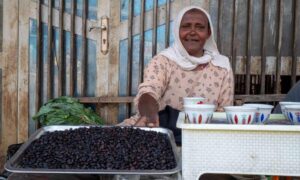
The first white flowers are starting to appear on the branches of Habtamu Wolde’s coffee bushes in the Kafa region of southwest Ethiopia. They will bloom several more times before turning into round red cherries ready for harvesting in October. Then they will be prepared for export and shipped to the capital.
Our coffee is iconic, you cannot find a higher grade,” boasts Habtamu. Coffee is more than a drink in Kafa. This region claims to be the birthplace of Arabica coffee, which grows naturally in its temperate cloud forests. The plant is at the centre of daily life and the people’s main source of income.
“Coffee is part of the Kafa people’s identity,” says Habtamu, from his eight-hectare (20-acre) plantation. “We would not survive without it.”
Across Ethiopia, 5 million smallholders depend on growing coffee. Another 10 million workers wash, process and transport the beans. The industry has boomed in recent years, helping drive Ethiopia’s economic growth. But producers say it is at risk from new European legislation – the EU Regulation on Deforestation-free Products (EUDR) – due to come into force in 2025.
The EUDR bans the sale of coffee, rubber, cocoa and other products if companies cannot prove that it did not come from deforested land. Environmentalists have hailed it as an historic achievement.
Yet Ethiopia’s coffee industry claims the new rules are unfair since almost all Ethiopia’s coffee is grown by poor farmers who own small plots of land and lack the expertise to gather the complex data needed to show compliance.
Abebe and other Ethiopian coffee officials argue that their beans are more sustainable than those from other big producers, such as Brazil, where most coffee plantations are vast monocultures cut from the jungle, sustained by fertiliser and devoid of trees.
By contrast, Ethiopia’s coffee farming relies on maintaining forests and the shade they provide, which protects coffee plants from the heat. The beans are grown by smallholders who on average cultivate less than two hectares of land. Abebe says: “Our way of growing coffee is far less damaging.”
